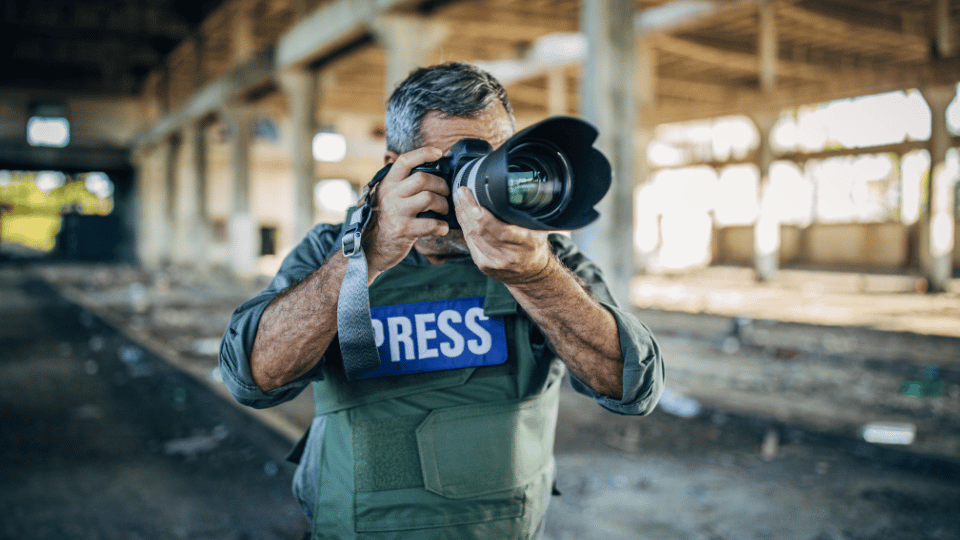In today’s fast-paced and interconnected world, the role of war journalism is more important than ever. As conflicts and crises continue to unfold across the globe, it is the responsibility of journalists to provide accurate and unbiased coverage of these events. War journalism goes beyond simply reporting the facts; it delves into the heart of conflicts, shedding light on human stories and the impact they have on societies. In this article, we will explore the crucial role that war journalism plays in covering crisis and conflict, and the skills and qualities required to excel in this field.
1. Reporting from the Frontlines
War journalists are often found at the frontlines of conflict, risking their lives to bring the truth to the world. They provide firsthand accounts, capturing the chaos and devastation that war brings. These journalists play a critical role in ensuring that the public is informed about the realities of war and its consequences. Their reports can shape public opinion, influence policy decisions, and even help bring about change.
2. Unbiased and Ethical Reporting
In war journalism, maintaining impartiality and adhering to ethical standards is paramount. Journalists must strive to present a balanced view of the conflict, avoiding personal biases and agendas. They are tasked with presenting the facts objectively, giving voice to all sides involved, and providing context to help the audience understand the complex dynamics at play.
3. Telling Human Stories
War journalism goes beyond the statistics and political rhetoric; it humanizes the conflict by telling the stories of those affected. Journalists capture the struggles, resilience, and courage of individuals caught in the midst of war. Through their reporting, they give a voice to the voiceless, shining a light on the human toll of conflict and fostering empathy and understanding.
4. Investigative Journalism
Investigative journalism plays a crucial role in uncovering the truth behind conflicts and crises. Journalists dig deep to expose corruption, human rights abuses, and war crimes. Their work holds those responsible accountable and seeks justice for the victims. Investigative war journalism requires meticulous research, extensive fieldwork, and the courage to confront powerful individuals or organizations.
5. Digital and Multimedia Skills
In today’s digital age, war journalists must possess a range of technical skills to effectively report and disseminate information. They must be proficient in using various multimedia tools, including photography, video, and social media, to capture and share stories. These skills enable journalists to reach wider audiences, engage with them, and provide real-time updates from the field.
6. Cultural Sensitivity and Language Skills
War journalists often find themselves in unfamiliar territories, navigating different cultures, languages, and customs. Having a deep understanding and respect for the local culture is essential to build trust with the communities they cover. Language skills are invaluable, allowing journalists to communicate directly with sources, overcoming barriers and capturing nuanced accounts of the conflict.
7. Resilience and Mental Well-being
Covering crisis and conflict can take a toll on journalists’ mental and emotional well-being. Witnessing and reporting on traumatic events can lead to stress, compassion fatigue, and other psychological challenges. It is crucial for war journalists to prioritize self-care and seek support when needed. Building resilience and maintaining mental well-being are essential for long-term success in this demanding field.
Conclusion
The role of war journalism in covering crisis and conflict is vital for informing the public, holding accountable those responsible, and giving voice to the affected. It requires a unique set of skills, including unbiased reporting, investigative journalism, storytelling, digital proficiency, cultural sensitivity, and resilience.
Key Takeaways:
- War journalism plays a crucial role in providing accurate and unbiased coverage of conflicts and crises, going beyond reporting facts to shed light on human stories and societal impact.
- War journalists report from the frontlines, risking their lives to bring firsthand accounts and raise awareness about the realities of war.
- Maintaining impartiality and adhering to ethical standards are essential in war journalism to present a balanced view of conflicts and provide objective context.
- War journalists humanize conflicts by telling the stories of those affected, giving a voice to the voiceless, and fostering empathy and understanding.
- Investigative journalism uncovers the truth behind conflicts, exposing corruption, human rights abuses, and seeking justice for victims.
- Digital and multimedia skills are crucial in today’s digital age, allowing war journalists to effectively capture and share stories using various mediums.
- Cultural sensitivity and language skills are vital in navigating unfamiliar territories and building trust with the communities being covered.
- Resilience and prioritizing mental well-being are necessary for war journalists due to the potential psychological toll of witnessing and reporting on traumatic events.
To acquire the knowledge and skills necessary for a career in war journalism, consider taking the NYU | Modern Journalism online course and certificate program. These programs offered by New York University (NYU) and Parsons School of Design (Parsons) can provide valuable education and training to excel in this field. By embracing the responsibilities and challenges of war journalism, you can make a significant impact and contribute to a more informed and compassionate world.



